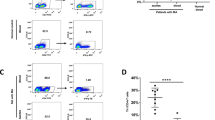Abstract:
Objective: To study the effect of peritoneal macrophages on tumor cell proliferation, we cultured ascites hepatoma AH-130 cells with unstimulated, or lipopolysaccharide (LPS)- or interleukin (IL)-2-stimulated rat peritoneal macrophages, and examined the proliferation of AH-130 cells.¶Materials and Methods: Rat peritoneal macrophages isolated from male Wistar rats were co-cultured with AH-130 cells in the absence or presence of LPS or IL-2. After incubation, proliferation of AH-130 cells was analyzed using flow cytometry. In addition, the levels of tumor necrosis factor (TNF)-α and nitric oxide (NOx, nitrate + nitrite) in the culture supernatants were measured. Furthermore, anti-TNF-α antibody (10 μg/ml) and nitric oxide synthase inhibitor, N G-monomethyl-L-arginine (L-NMMA, 100 μM) were added to the co-culture, and their effect on AH-130 cell proliferation was examined.¶Results: When AH-130 cells were co-cultured with unstimulated peritoneal macrophages, proliferation of AH-130 cells was not affected. In contrast, when AH-130 cells were co-cultured with peritoneal macrophages in the presence of LPS (0.1-20 μg/ml) or IL-2 (1-200 U/ml), proliferation of AH-130 cells was dose-dependently suppressed by LPS or IL-2. Moreover, LPS- or IL-2-stimulation increased the levels of TNF-α and NOx in the supernatants of AH-130 cell and macrophage co-culture, although LPS and IL-2 did not induce TNF-α and NOx production by AH-130 cells incubated without macrophages. Interestingly, anti-TNF-α antibody and L-NMMA significantly inhibited the suppression of AH-130 cell proliferation by LPS- or IL-2-stimulated macrophages (p<0.05). Furthermore, exogenously added recombinant rat TNF-α (0.26-1300 ng/ml) or NO donor (GSNO, S-nitroso-L-glutathione) (0.1-10 mM) dose-dependently suppressed the proliferation of AH-130 cells in the absence of macrophages.¶Conclusion: Together these observations suggest that when peritoneal macrophages are activated by LPS and IL-2, they suppress the proliferation of ascites hepatoma AH-130 cells via the production of TNF-α and nitric oxide.¶
Similar content being viewed by others
Author information
Authors and Affiliations
Additional information
Received 26 August 1999; returned for revision 3 October 1999; accepted by M. Katori 18 May 2000.
Rights and permissions
About this article
Cite this article
Maekawa, H., Iwabuchi, K., Nagaoka, I. et al. Activated peritoneal macrophages inhibit the proliferation of rat ascites hepatoma AH-130 cells via the production of tumor necrosis factor-α and nitric oxide. Inflamm. res. 49, 541–547 (2000). https://doi.org/10.1007/s000110050629
Issue Date:
DOI: https://doi.org/10.1007/s000110050629




